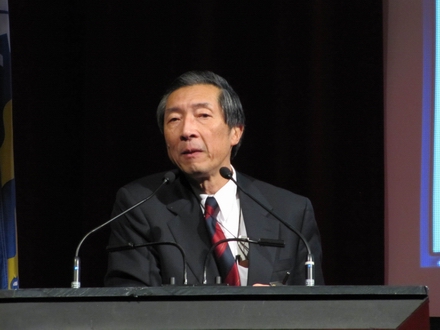Canadians Need to Think Outside the Box When it Comes to Trade with China
By 250 News
Wednesday, January 12, 2011 01:51 PM
 Prince George, B.C. – When it comes to trade with China, Dr. David Fung, Chair and CEO of the ACDEG Group of Companies says the key is not just to sell natural resources.
Prince George, B.C. – When it comes to trade with China, Dr. David Fung, Chair and CEO of the ACDEG Group of Companies says the key is not just to sell natural resources.Dr. Fung says Canada has all the natural resources, and is the most educated country in the world, however, Korea, which has virtually no resources has surpassed Canada when it comes to GDP. “That tells me that with all our resources, we ( Canada) are not leveraging those resources.”
Dr. Fung told the Natural Resources forum underway in Prince George that as more Chinese move into cities, they are creating an urban population base that is equal to “creating a new Canada” every year. Dr. Fung says as those people build new housing, “We don’t need them to build them all with wood, we just need them to use some wood.”
He says Canadians have to start thinking differently, that instead of just shipping a natural resource, we have to look at getting maximum value for that resource. “If you catch a salmon , process it, and ship it you get about $15 dollars a pound. If you freeze it you get about $10 dollars a pound. But if you catch the fish and ship the fish live, you get about $60 dollars a pound and it takes far more people to make sure that fish arrives alive, so there are good B.C. jobs being created.”
He pointed to China having about $2.75 Trillion dollars in foreign exchange reserve “We need to help China spend some of that money.”
Previous Story - Next Story
Return to Home










I feel totally embarassed for this country and the people I see around me to have this individual tell me what has to be the most obvious thing in the world.
So, people, hit me if you will, but how much longer do we have to hear such things before we smarten up???
We have begun to develop the physical infrastructure around these parts, but we have failed to develop the mental, knowledge based infrastructure.
We will continue to be the huers of wood and drawers of water for as long as that is the only vision we have of ourselves. Well, that vision is long gone the way of the dodo bird.
Pick up the latest version of National Geographic which is simply another publication that tells the same story.
What is this community doing to move into the next phase of the realities of life on this planet? I see very little innovation, if any.